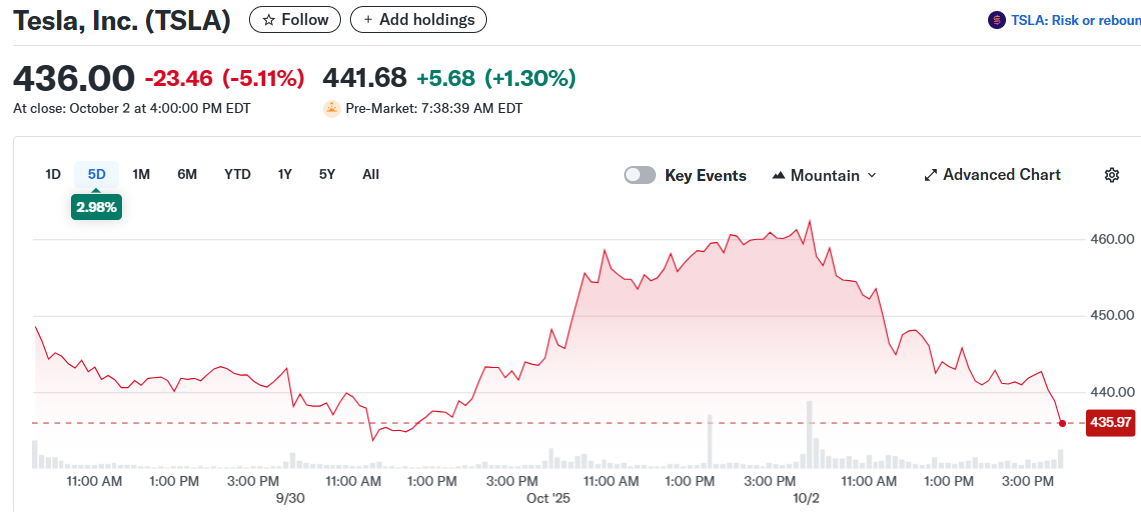TLDR
- Tesla delivered strong Q3 numbers but shares fell 5.1% Thursday as investors had already priced in the tax credit rush
- The $7,500 federal EV tax credit expiration drove buyers to accelerate purchases across all EV makers
- NYC Comptroller opposes Musk’s potential $1 trillion pay package but analysts expect it to pass easily
- Retail investors control 40% of Tesla shares, making proxy advisory firm recommendations less effective
- The company trades at 175 times 2026 earnings as it shifts focus toward AI and autonomous vehicles
Tesla posted better-than-expected third quarter deliveries on Thursday. But shares dropped 5.1% anyway.

The stock recovered Friday, gaining 1.6% to $442.96 in early trading. It’s up 38% over the past three months and 75% over the past year.
The delivery beat came as American buyers rushed to purchase EVs. They wanted to capture the $7,500 federal tax credit before it expired.
Congress phased out the subsidy under Republican leadership. GM, Ford, and Rivian also reported strong Q3 EV sales from the same rush.
Why Did Tesla Stock Fall on Good News?
The answer is simple. Investors had already anticipated the results.
Shares rose about 40% in the month leading up to the delivery report. The market looks forward, not backward.
Canaccord analyst George Gianarikas called the results a “banger.” But he raised concerns about what comes next.
“The question now is how will [fourth quarter] and 2026 shape up after the U.S. EV tax credits have gone away?” he wrote. He projects Q4 sales will decline but expects growth in 2026.
The company now faces a harsher market. The cushion of government subsidies is gone.
Tesla’s first half of 2025 was already challenging. Public backlash against CEO Elon Musk weighed on the business.
The Pay Package Battle
New York City’s Comptroller sent a letter Thursday criticizing Tesla’s governance. The letter urged shareholders to reject Musk’s pay package.
The package could reach $1 trillion if all performance targets are met. Critics call it excessive for any single CEO.
Analysts disagree about its chances of failing. Wedbush analyst Dan Ives said there’s a “better chance of me playing in the NFL this season” than the package getting voted down.
Retail investors hold about 40% of Tesla’s tradable shares. That’s double the level of other large tech stocks.
These shareholders have consistently supported Musk’s compensation plans. They’ve done so even when proxy advisors recommended voting no.
The package relates to Musk’s goal of controlling 25% of Tesla stock. He wants protection against being removed from leadership.
The AI Transformation
Tesla is repositioning itself as an AI and robotics company rather than just an automaker. The Cybercab autonomous vehicle launches production next year.
The dedicated robotaxi represents the core of Tesla’s self-driving service plans. Bulls see it as a game-changer.
“The AI valuation will start to get unlocked in the Tesla story,” Ives wrote. He believes the shift toward AI-driven valuation has started.
Ives expects the Trump administration to accelerate Tesla’s autonomous vehicle approvals. He argues American AI leadership creates aligned interests between government and the company.
Tesla currently trades at 175 times estimated 2026 earnings. That’s expensive by traditional auto industry standards.
But supporters argue Tesla isn’t a traditional car company. They say it shouldn’t be valued like one.
Market technician Katie Stockton suggests holding shares. She sees potential for new all-time highs.
She recommends watching the 50-day moving average at $361. Breaking below that level would signal trouble.





